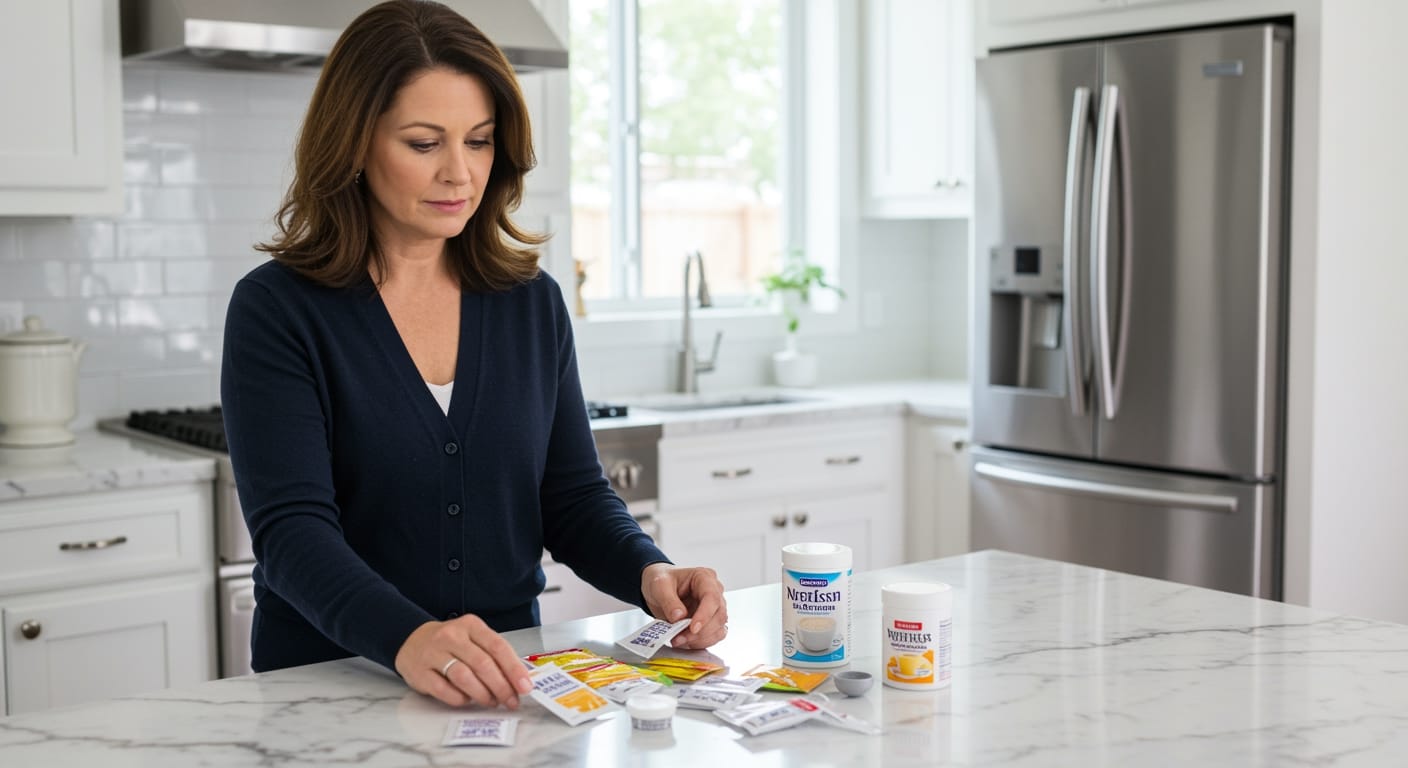✪ Key Takeaway: Artificial sweeteners are generally safe for diabetics short-term but may cause gut health issues and cravings long-term.
Introduction
You reach for that diet soda thinking you made the smart choice for your diabetes.
But what if I told you that artificial sweeteners might be creating problems you never expected?
Hi, I’m Abdur, your nutrition coach and today I’m going to explain whether artificial sweeteners are truly safe for diabetics in the long run, and what the latest research reveals about their hidden effects on your body.
Do Artificial Sweeteners Actually Raise Blood Sugar?
Most artificial sweeteners do not directly spike your blood glucose levels.
Aspartame, sucralose, and stevia pass through your body without being broken down into sugar.
This means your pancreas does not need to produce extra insulin to handle them.
However, recent studies show that some artificial sweeteners may affect your body’s insulin sensitivity over time.
Research published in 2023 found that people who consumed artificial sweeteners daily for six months showed changes in their glucose metabolism.
The changes were small but measurable, suggesting that long-term use might influence how your body processes real sugar when you do eat it.
✪ Pro Tip: Monitor your blood sugar for two weeks after adding any new artificial sweetener to spot individual reactions.
What Happens to Your Gut When You Use Artificial Sweeteners?
Your gut bacteria play a crucial role in managing your diabetes.
Artificial sweeteners can significantly alter your gut microbiome composition.
Studies show that sucralose reduces beneficial bacteria like Bifidobacterium by up to 50 percent.
These good bacteria help regulate inflammation and support healthy blood sugar control.
When you lose these protective bacteria, your body may become more prone to insulin resistance.
Some people experience digestive issues like bloating, gas, or diarrhea when consuming large amounts of artificial sweeteners.
The gut changes can take weeks or months to reverse once you stop using artificial sweeteners regularly.
✪ Fun Fact: Your gut bacteria can influence your sugar cravings through chemical signals sent to your brain.
Can Artificial Sweeteners Increase Your Sugar Cravings?
This might surprise you, but artificial sweeteners can actually make you crave more sweet foods.
Your brain expects calories when it tastes something sweet.
When those calories never arrive, your brain sends signals to seek out more food.
This can lead to overeating later in the day, which obviously affects your blood sugar management.
Research shows that people who drink diet sodas regularly tend to gain more weight over time compared to those who avoid them.
The artificial sweeteners may also disrupt your body’s natural ability to gauge calorie intake from sweet foods.
This means you might eat more real sugar when you do encounter it because your body has lost its calibration.
✪ Note: Stevia appears to cause fewer cravings compared to synthetic sweeteners like aspartame or sucralose.
Are Some Artificial Sweeteners Safer Than Others?
Not all artificial sweeteners affect your body the same way.
Stevia and monk fruit are plant-based options that seem to have fewer negative effects on gut bacteria.
Erythritol is a sugar alcohol that most people tolerate well in small amounts.
However, recent studies have linked erythritol to increased risk of blood clots and heart problems in some people.
Aspartame and sucralose are the most studied artificial sweeteners, but they also show the most concerning effects on gut health.
Saccharin, one of the oldest artificial sweeteners, may be the most disruptive to your gut bacteria.
The safest approach is to rotate between different types rather than using the same one every day.
✪ Pro Tip: Limit total artificial sweetener intake to no more than the equivalent of 2-3 diet sodas per day.
What Should Diabetics Do Instead?
The goal is not to eliminate all sweetness from your life.
Instead, focus on retraining your taste buds to appreciate less intense sweetness.
Start by gradually reducing the amount of any sweetener you use, whether artificial or natural.
Use spices like cinnamon, vanilla, or nutmeg to add flavor without sweetness.
When you do use sweeteners, choose natural options like stevia or small amounts of raw honey if your blood sugar allows.
Focus on eating whole foods that naturally taste good without added sweeteners.
Remember that managing diabetes successfully means finding a balance between enjoying food and maintaining stable blood glucose levels.
✪ Fun Fact: It takes about 2-3 weeks for your taste buds to adjust to less sweet foods and actually prefer them.
The Bottom Line
Artificial sweeteners are not the diabetes miracle solution they were once thought to be.
As I always tell my clients, “The best sweetener is the one you need the least of.”
What questions do you have about artificial sweeteners and diabetes management? Share your thoughts in the comments below and let me know about your experiences with different sweeteners.
References
At NutritionCrown, we use quality and credible sources to ensure our content is accurate and trustworthy. Below are the sources referenced in creating this article:





